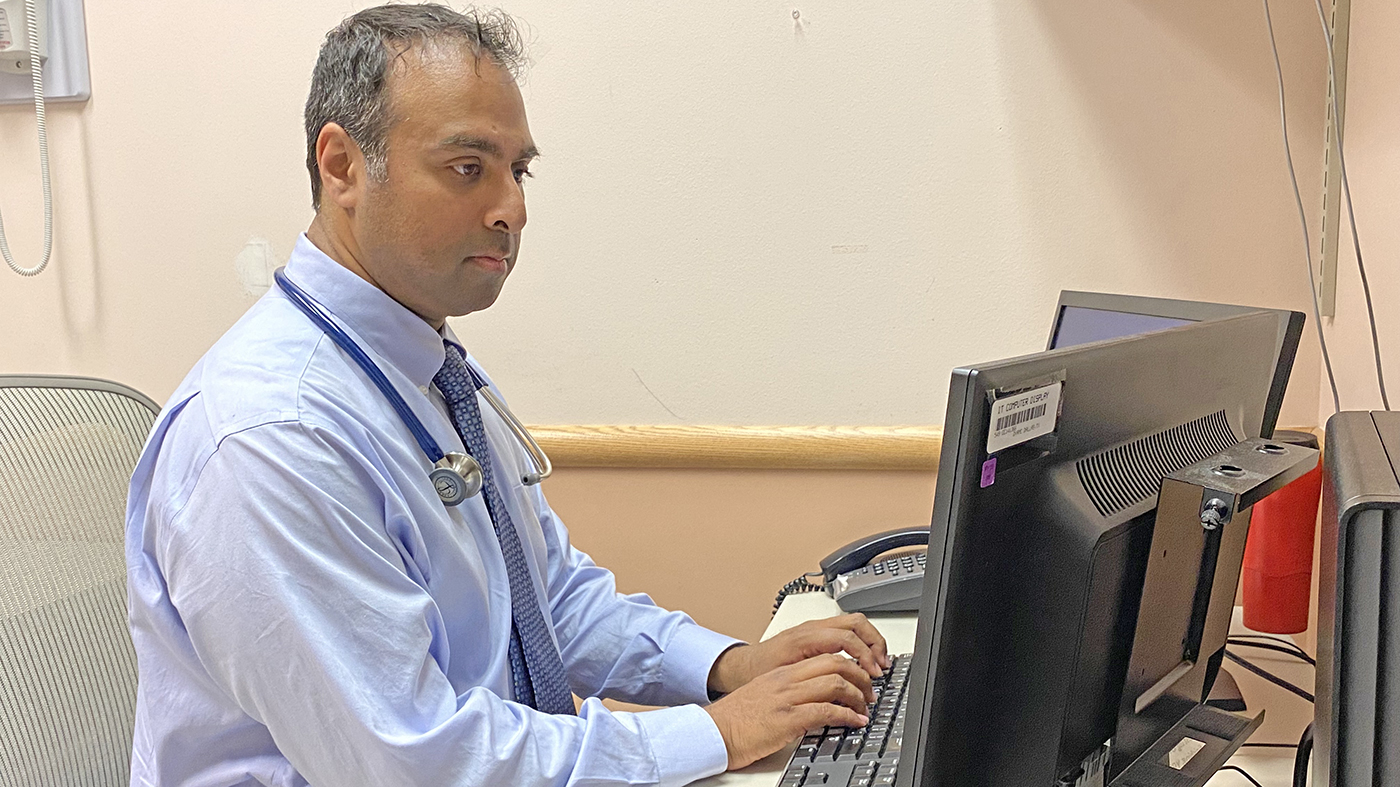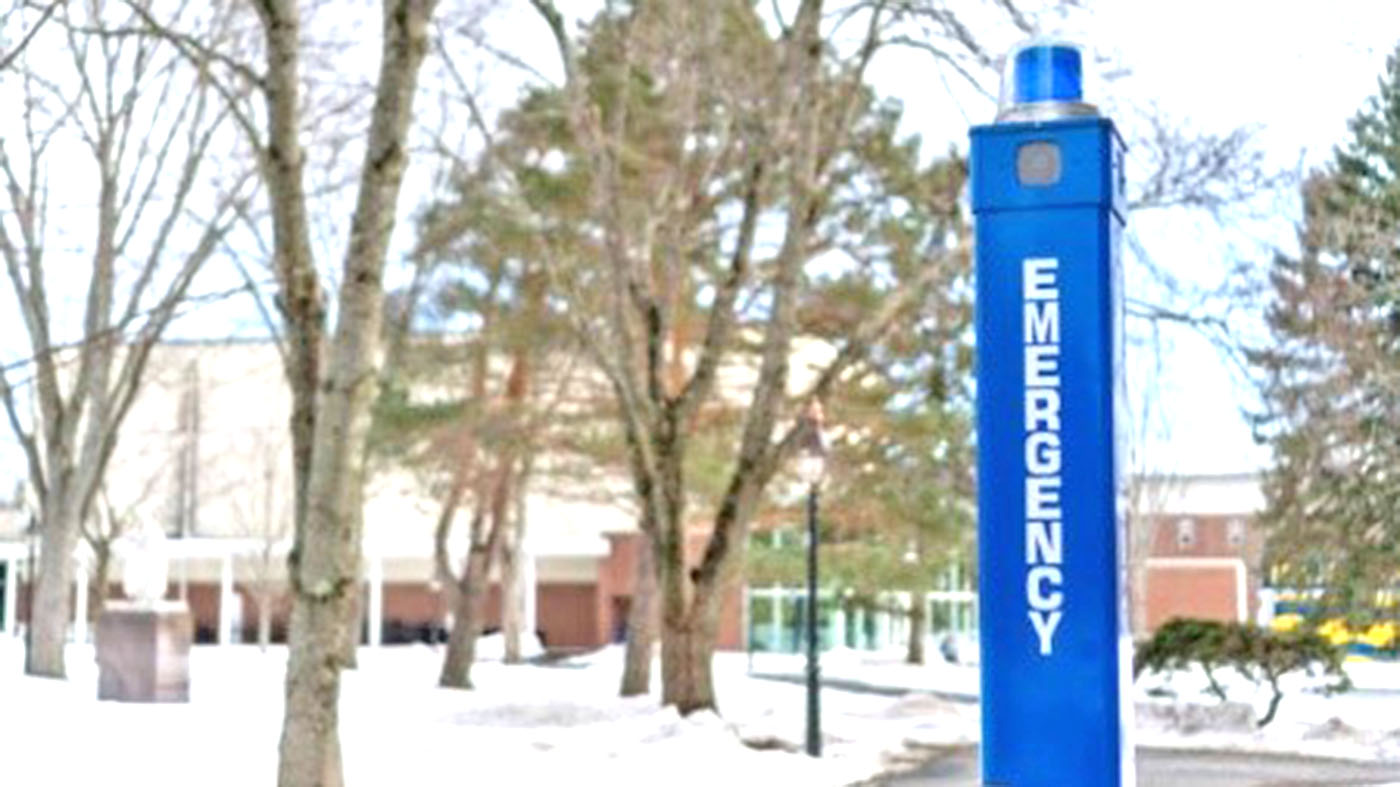Have you ever been told you are allergic to penicillin? Maybe a childhood rash led a physician to annotate your medical records for years with a penicillin allergy label?
That might not be accurate.
“Many of our Veterans carry a penicillin allergy label that is outdated and possibly incorrect,” said Dr. Reuben Arasaratnam, staff physician in infectious disease at Dallas VA.” Up to 15-percent of hospitalized VA inpatients carry this label, yet over 90-percent of these are found to be untrue.”
Arasaratnam (pictured above) speaks from experience both as a physician and as an associate professor at UT Southwestern Medical Center. He shares a story that is not just about labels but about the lives they affect.
“I remember a Veteran who came in with an infection we knew penicillin could easily treat. But there it was on his chart… a childhood penicillin allergy that had followed him into adulthood, into his service and now into our hospital. It wasn’t just a note in his file. It was a barrier between John and the best care we could give,” Arasaratnam recalled.
Avoiding penicillin-based treatment could impact patient care
This story of care postponed due to an unchallenged label is not unique. It’s echoed in the halls of VA, in the lives of Veterans who may not need to avoid penicillin-based treatments. Arasaratnam and his team recognized the gravity of this and the impact it could have on patient care.
“Many people still believe penicillin allergies are inherited when there is no family relatedness to penicillin allergy. Even if you did have a true penicillin allergy, studies show these allergies wane over time. After 10 years, 80% of these allergies will no longer be present after formal testing,” Arasaratnam continued.
Arasaratnam’ s team at North Texas VA embarked on a program to reevaluate these penicillin allergies grounded in the belief that every Veteran deserves the best care.
“We don’t have allergy specialists in every facility, but we have committed physicians, pharmacists and clinical coordinators willing to step up. We’ve been able to remove the penicillin allergy label for a third of the Veterans we’ve seen.”
Arasaratnam’ s narrative is intertwined with gratitude for his team at VA and partners at UT Southwestern. It takes a team of people who care enough to go the extra mile in making the collective effort that has made this program, possible.
For Veterans, it’s an invitation to reconsider what they know about their health and to trust in VA’s commitment to providing cutting-edge medical technology. The resolving of long-held questions for those Veterans and using the best antibiotic therapies is changing Veteran’s life stories.
“This might not seem like a big deal… a childhood rash mislabeled as a penicillin allergy… but it can affect them in the long term. We’re here to ensure they get the medications they need without unnecessary risk.”
Topics in this story
More Stories
After Addison’s Disease and lumbar spine surgery, nurse Veteran Gayle Smith re-learned how to ski. “You have more courage than you think.”
Follow these 10 winter safety tips to stay warm, safe and protected during the cold winter.
Forget 'No Pain, No Gain'—try 'No Pain, More Gain' with Tai Chi! Calm the mind and gift yourself well-being in this week's #LiveWholeHealth practice.







I had a rash and itched very bad in 1960 at Robins AFB,Ga after taking a penicillin shot. Since then my medical records reflected I’m allergic to penicillin.
In 2020, I was prescribed Amoxycillin. I had no reason to believe that there would be a problem, since I had taken it numerous times as a child. Unfortunately, I had developed an allergy to it in my old age, and the way it hit me reminded me of when the Russians poisoned Alexei Navalny with novichok. Nobody thought at first that it was an allergy, including me, because I had taken it numerous times as a child.
Thank you for this information. I will talk to my PCP about this. It has been a long time since I was diagnosed!
As a student doing my Doctorate in Chinese Medicine and Acupuncture, a Veteran with this allergy, as well as sulfa drugs, macrobid, statins, calcium blockers, this kind of arrogance in removing allergies under a non-RCT (randomized controlled trial), without the oversight or proper testing is dangerous and arrogant.
I would not want to see this doctor or want them anywhere near me if he is going to disregard a histamic reaction or a patient’s medical record because of some evidence based practice. Which I guarantee if I, as a doctor with the same medical training and twice the patient treatment experience than that of a medical fellow, presented, would be banned from practice and lose my license.
There is an overuse of antibiotics in Western Medicine, especially in the US and Latin American Countries, they should be used only in cases of strep throat, septicemia, post-operative transplants, dental procedures for those with heart issues, skin sores that are not healing properly or become abcessed, STI’s that are bacterial, severe skin infections, and uti’s to prevent kidney infections. That is off the top of my head. Most things can be treated without anti-biotics and things should be properly assessed and tested to show bacterial infection. That is off the top of my head and if a person has a reaction, cease the treatment immediately.
This guy’s arrogance is going to kill someone and this university affiliation using us as guinea pigs to test theories further demonstrates that research universities have NO business deeply embedded in VA Healthcare where there is profit and dangerous practices developed and deployed to harming us-
[Editor: In your first sentence, you wrote, “removing allergies under a non-RCT (randomized controlled trial), without the oversight or proper testing…” but it is, in fact, administered by their health care teams via test. I was unable to get the author to elaborate on what/how the test was administered prior to publishing. Like most VA News stories, Veterans who take interest in these posts should inquire with their providers.]
I believe you misread or misunderstood what the Doctor was stating. The VA did not in my case, under any circumstances, just change my allergy-to non allergy. I am not sure what the RCT you are talking about is. But, in my case, the procedure to determine if my “allergy” to Penicillin was still valid-an approximately 4 hour procedure/tests were done. The Dr and the Nurse doing the procedures/tests-were very professional. And, took the testing very seriously. When one of the skin tests came back with a result that could have been interpited either way-The whole procedure was started over. Nothing was left to chance or interpretation. Everything was a definite Yes or No.
As it turned out in my case, either there was never an allergy to penicillin (misdiagnosed?) or maybe the allergy wore off over the years. I believe that was what the Dr was saying and it would of benefit to have the VA test one for it.
I had a reaction as a civilian, many years ago that was on my V.A. record. Approximately 2 years ago, I was in the Cleveland, Ohio, V.A. ER for an entirely different reason. The doctor asked a few questions, including penicillin allergy. He informed me that it might no longer be prevalent, so, a test was initiated and, BINGO, no longer an issue! The allergy was removed from my file and all is well!
This is a follow up to my comment below. Hope the moderator will allow it. I asked my Primary VA care Dr., to submit a referral for me to get tested. The VA, at the Birmingham VAMC Allergy Clinic, did the penicillin allergy test on me. It was an approximately 4 hour test. It is very very specific. They did it by applying PCN to on/and in my skin(multiple times). When that come back negative, I was then given a small dose of oral PCN. When that came back negative, I was then given a 500mg tablet of PCN-That is what they did in my case. When the test was complete-they said there was no question that I was not allergic to penicillin. That was great news for me. All of the VA medical personel was very supportive of me getting the test done. All I had to do to get it started, was to ask my primary care VA medical team. about getting tested.
how do you get tested for penicillin allergy? I had blood drawn 20 years ago for a test my doctor told me I was highly allergic to penicillin
Thank you all for your dedication to serving us veterans.
I had an adverse reaction to penicillin as a child. My airway swelled and since then I have never received penicillin. I would very much like to know how I can be tested to see if in fact I still am. I had a bout with cellulitis that lasted 6 months and the Doctor from Texas IDC said penicillin would have been the answer to clearing this up.
Thank you for your attention to this issue.
V/ r
Betty Seibel
SKCS (SW/AW) USN Retired
I’ve was told for the last 58 years (including 21 years in the Army), I had a penicillin allergy. Had my VA PCM send a referral into the Birmingham, AL VAMC(Allergy Clinic)-to determine if I had a valid PCN allergy. This was done approximately 6 weeks ago. It was a haft a day process and-IT was determined I did not have a penicllian allergy. I did this because approximately 2 years ago, I had a really bad infection. PCN was the antibiotic of choice. But could not take it. The only other option was an IV drip for 48 hours, in the hospital. If you have/r believe you have a PCN allergy-have the VA check it out for you.
How does someone with a penicillin allergy on his records get reevaluated?